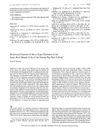TLDR Small proline-rich proteins and trichohyalin help make epithelial tissues tougher and more flexible.
The study provided biochemical evidence that small proline-rich proteins (SPRs) and trichohyalin (THH) played crucial roles in modulating the biomechanical properties of cornified cell envelopes (CEs) in epithelia. SPRs functioned as cross-bridging proteins, forming interchain cross-links with other CE proteins such as loricrin, envoplakin, involucrin, and keratin 1, enhancing the structural integrity and toughness of tissues like the forestomach. The research showed that the amount of SPRs varied according to the physical requirements of the tissues, suggesting a significant role for SPRs and THH in determining the biomechanical properties of epithelia.
135 citations
,
October 1997 in “Journal of biological chemistry/The Journal of biological chemistry” Trichohyalin is modified by enzymes to form strong structures in hair cells.
22 citations
,
October 1996 in “Dermatologic clinics” Understanding intermediate filaments helps explain hair health and related diseases.
26 citations
,
April 1996 in “Journal of Investigative Dermatology” 27 citations
,
July 1993 in “The journal of investigative dermatology/Journal of investigative dermatology” 161 citations
,
June 1993 in “Journal of Biological Chemistry” Trichohyalin helps in hair and skin cell structure and function by binding calcium and linking proteins.
72 citations
,
May 1993 in “The Journal of Cell Biology” Trichohyalin in sheep hair follicles may help with structure and calcium binding.
 90 citations
,
January 1979 in “International review of cytology”
90 citations
,
January 1979 in “International review of cytology” Wool follicles are complex, involving interactions between different cell types and structures.
 24 citations
,
November 1978 in “Biochemistry”
24 citations
,
November 1978 in “Biochemistry” α-type filaments in guinea pig hair follicles have unique structural features.
22 citations
,
August 2020 in “Cells” TGM3 is important for skin and hair structure and may help diagnose cancer.
 February 2025 in “Animals”
February 2025 in “Animals” Understanding proteins in skin structures like claws and hair is crucial for future research.
28 citations
,
August 2005 in “Journal of Investigative Dermatology” TG5 helps maintain hair follicle health, while TG3 aids in hair shaft development.
30 citations
,
August 2008 in “The journal of investigative dermatology/Journal of investigative dermatology” TGase 3 helps build hair structure by forming strong bonds between proteins.
 199 citations
,
January 2004 in “The International Journal of Developmental Biology”
199 citations
,
January 2004 in “The International Journal of Developmental Biology” Hair follicle growth and development are controlled by specific genes and molecular signals.



